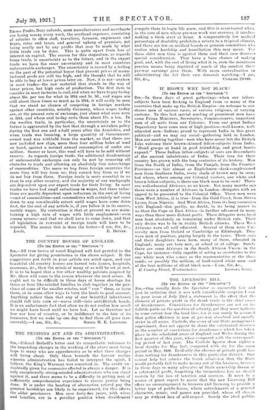IF BROWN WHY NOT BLACK? [To TEl EDITOR Of THE
"SPECTATOR."] SIR,—In these days of great gatherings—when our fellow.
subjects have been flocking to England from so many of the countries that make up the British Empire—we welcome to our shores men of various races, of various religions, of varying customs. To this last special meeting of prominent men have come Prime Ministers, Secretaries, Commissioners, important men of all sorts from our Colonies. From our great Indian Dependency have come men of high position—well-known, a ell. educated men—Indians proud to represent India in this great political—and we may say social—gathering held in -London.
Men are meeting together—men who have never left the British Isles welcome their brown-skinned fellow-subjects from India.
"Hand grasps at hand in good friendship, and great heart; expand." These Indian fellow-subjects of ours are descendants of the ancient inhabitants of India. Their love for their country has grown with the long centuries of its history. Men from the North of India, from the Punjab, from the Frontier Provinces—as fair almost as Englishmen—dark-complexioned men from Southern India, every shade of brown may be seen; but where, where among our Colonial visitors, our white and brown fellow-subjects, is there one black man to be seen? There are well-educated Africans, as we know. Not many months ago there were a number of Africans in London—delegates with an appeal to be presented to the Colonial Office. These men were from West Africa, it is true—from the Gold Coast, from Sierra Leone, from Nigeria. -And West Africa, from its long connexion with England—due partly, no doubt, to its being nearer to us than the Cape or East Africa—is further advanced in many ways than those more distant parts. These delegates were loyal men bent absolutely on remaining under British rule. Their only desire was to be in reality British citizens. These West Africans were all well educated. Several of them were Uni- versity men from Oxford or Cambridge or Edinburgh. They
were men of position, paying largely to the taxes. Their POO;
and their daughters have been, many of them, educated in England; many are here now, at school or at college. Surely
there are some Africans in the South African Union—in the Cape, for instance—fully capable of acting as secretaries to the one white man who comes as the representative of the thon- sands, or possibly the million, of loud-voiced white men--and of the four millions of silent black men.—I am, Sir, &e., 17 Cowley Street, Westminster. LEONORA SCOTT.


































 Previous page
Previous page